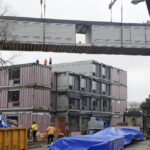Modular building under construction will provide housing for dozens

LONDON: The on-site delivery and craning-in of the first modules that will become new permanent supportive homes for 57 individuals experiencing homelessness was completed last week at 39 Dundalk Dr. in Scarborough.
When completed, the supportive housing building will be operated by Homes First Society. This non-profit housing organization provides affordable, stable housing and support services with the aim of breaking the cycle of homelessness.
“Individuals who were formerly homeless will now have a home, with 24-hour staff on hand, specialized case managers, and a full meal program,” said Patricia Mueller, CEO, Homes First Society, in a Jan. 20 city news release.
Modular housing is one of the ways the city said it’s making progress toward meeting its HousingTO action plan of providing 40,000 new affordable rental homes, including 18,000 supportive homes, by 2030. The city said there are almost 150 city-led and/or city-supported affordable housing projects in the development pipeline. Some of these include large, multi-phase developments. Once completed, these projects will deliver over 20,000 affordable rental and supportive homes.
Building on these objectives, the city notes the 2023 tabled budget, includes over $616 million in direct support for housing initiatives.
The Dundalk Drive modular homes, according to the release, will provide good quality and deeply affordable homes that better meet the needs of residents who are currently residing at a hotel shelter adjacent to the Dundalk site.
Residents will pay rent based on their incomes and have access to a private studio apartment (with a kitchen and a bathroom) and ample amenity spaces. This includes a commercial kitchen, laundry room, large programming spaces and office/support areas.
Future residents will include women, Indigenous residents, seniors and persons with disabilities.
The city said modular construction provides a unique opportunity to respond rapidly to Toronto’s urgent need to create more permanent affordable homes for people experiencing homelessness while reducing pressure on the city’s emergency shelter system.
It also supports the city’s climate change action, as these energy-efficient homes are prefabricated in a factory and transported to the site, where they are assembled. The benefits of modular construction, compared to traditional construction, include speed, cost efficiency and lower carbon emissions.
The homes at this site are part of the second phase of the Modular Housing Initiative (MHI), approved by City Council in April 2020 and funded through a partnership between the city and the federal government. This unique partnership allows the city to leverage land already within its portfolio to build more affordable and supportive homes.
The land at 39 Dundalk Dr. is owned by the Toronto Community Housing Corporation (TCHC) and is subject to a lease between the city and TCHC.
- A modular housing building being put up by the city at 39 Dundalk Dr. will soon provide housing and support to dozens of underhoused people.







